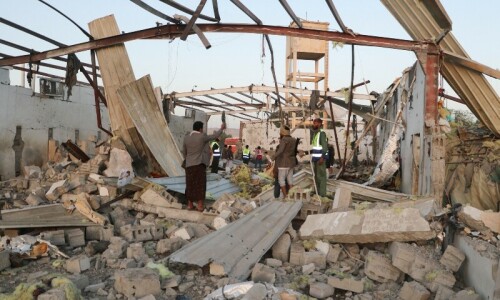
• Intelligence report identifies 100 black sheep
• National kitty losing Rs227bn in annual tax revenues
ISLAMABAD: While local refineries and oil marketing companies complain about falling capacity utilisation and sales, around 10 million litres of Iranian petrol and diesel are smuggled into Pakistan every day through land and sea routes, causing a more than Rs227 billion annual revenue loss.
It was revealed in a joint report by intelligence agencies to the Petroleum Division. Sources said the report entailed complete identities, addresses and contact numbers of 100 black sheep in around a dozen law enforcement agencies (LEAs), owners and operators of 533 illegal petrol stations across the country and 105 smugglers of Iranian oil. The report also contains precise information about informal border crossings and routes for trafficking smuggled items throughout Pakistan.
“Annual quantum of Iranian oil smuggling is around 2.8 billion litres which cause annual loss to the tune of at least Rs227bn to the national exchequer”, said the report, adding the smuggled petroleum products were being transported through unfrequented routes of Makran and Rakhshan divisions and sold predominantly at unauthorised roadside petrol outlets.
Of the 533 such petrol stations, an overwhelming majority—348—are located in Punjab as deep as Lahore, Faisalabad, Jhang, and Attock, pointing out the veracity of the menace. Another 116 outlets selling low-quality smuggled products are based in Balochistan, 38 in Sindh to the extent of Karachi, and another 31 in Khyber Pakhtunkhwa.
About a dozen agencies whose officials have been identified with names, phone numbers, CNICs, etc., for being involved in or facilitating illegal trade and business include customs intelligence, border management police, the offices of assistant and deputy commissioner, civil defence, police, customs enforcement, levies, excise and taxation, CIA police, and the police department.
Surging quantum
The report said the quantum of Iranian oil smuggling reached a peak of approximately 10.1m litres per day, which significantly reduced to 5-5.3m litres per day as a result of the crackdown launched by the caretaker government. “However, subsequent to the general elections, Iranian oil smuggling has resurged to an estimated 8.9m litres per day.”
“Out of total annual 2.8bn litres of smuggled Iranian oil, 95pc is brought under the informal system of Token/Parchi, established in 2021 by FC and local administration in Makran and Rakshan districts”, said the report, adding that 1,800 to 2,000 zambad vehicles, each with a capacity of 3,200-3,400 litres, are used daily to transport diesel across the border.
Similarly, 1,200-1,300 boats, each capable of carrying 1,600 to 2,000 litres, are entering Pakistan primarily via the Kuntani-Gawadar route. After crossing the border, the smuggled Iranian oil is stockpiled in underground storage facilities located in Gwadar, Panjgur, Mashkhail (Washuk), Chaghi, and Quetta, from where it is further transported into vehicles with secret compartments, such as passenger buses, zambad vehicles, oil tankers, trucks, pickups, dumpers, etc., for onward supply to the rest of the country, the report said.
Major consumption markets
It is said that approximately 45pc of smuggled Iranian oil is transported to Sindh and 25pc to both Punjab and KP, while the rest is consumed in Balochistan. “Smuggling of Iranian oil is not possible without the collusion of amoral officials of LEAs posted at various check-posts as reportedly, hundreds of oil tankers carrying millions of litters of Iranian oil cross Uthal, District Lasbella to Sindh (Karachi) daily after passing through a number of these check-posts”.
The report said that approximately Rs285bn per annum was paid to Iranian dealers. For bulk deals, payments are usually made in US dollars through any third country either through hawala/hundi. In this case, delivery of Iranian oil is made after the confirmation of receipt of amount in a third country.
Also, expatriates intending for remitting money to Pakistan are also contacted and the amount is received in the source country for adjustment against the delivery of Iranian oil in Pakistan.
For small supplies, Pakistani buyers make payments to Iranian suppliers in Tuman (Irani currency) at the borders. In addition, barter trade is also used, but it has a negligible share of 3-5pc in Iranian oil smuggling, the report said.
The report also talked about the socio-economic perspective. It said around 2.2 to 2.4 million people in Balochistan depended on Iranian oil smuggling for their livelihood. Mainly, Balochis of terrorism-hit southern Balochistan who otherwise have scarce economic opportunities are linked with the sale-purchase of smuggled Iranian oil.
Published in Dawn, May 2nd, 2024














































